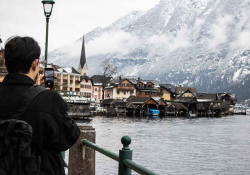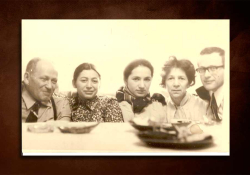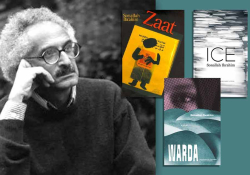To Resist a Dictatorship of the Absurd, an American Turns to Václav Havel

Hope is not prognostication. It is an orientation of the spirit, an orientation of the heart; it transcends the world that is immediately experienced and is anchored somewhere beyond its horizons.
—Václav Havel, Disturbing the Peace
Following the 2024 US presidential election, WLT editorial board member Erik Gleibermann turned to the writing of playwright and former president of Czechoslovakia Václav Havel, eventually continuing his ruminations in Prague.
My first day in Prague, the day they ordered the Marines into Los Angeles, I was sipping ginger tea at Václav Havel’s regular table in Café Slavia. Back in the 1950s, when Havel (1936–2011) and other dissidents began to gather here along the Vltava River to debate Kafka and Beckett and later slip each other anti-Soviet samizdat drafts, he’d smoke and order mineral water. He couldn’t afford more, he said, much less university tuition. Café Slavia became his university.
I’d biked to Slavia earlier that morning from Radio Prague at 12 Vinohradská Street, where I scanned the façade for bullet holes. During the 1968 invasion, the station continued to broadcast, even while Soviet-led troops killed seventeen protesters outside. Czech resisters soon began to scrawl mocking slogans in white chalk across the city. “Ivan, go home, your Natasha is dating Kolya.”
I’d returned to Havel’s writings for guidance days after the 2024 US presidential election as the initial shock set in, followed by the slow, pressing, insidious pall, the thin air of mild suffocation that Havel insisted through the decades we must not permit to smother hope. “None of us knows all the potentialities that slumber in the spirit of the population,” he affirmed in a 1986 interview reprinted in Disturbing the Peace, “or all the ways that population can surprise us when there is the right interplay of events, both visible and invisible.” He surely couldn’t have envisioned a play then that would end just three years later with a scene of him in Prague Castle as Czechoslovakia’s new president after an improvised “Velvet” Revolution.
Reflecting in Slavia, the castle visible across the river, now six months after the election, I read how the Trump government was attacking even more ruthlessly and widely than many of us had anticipated in November—not just the masked ICE agents swarming tomato fields, Home Depots, and courthouses; the threats against international allies; the offensives against universities, the press, law firms, the arts, service agencies, scientific research, public health, and the natural world itself—but the totalizing nihilistic assault on community, the very belief that our humanity consists of living in connection to one another.
Havel the resolute activist who helped lead the Charter 77 movement and endured years of imprisonment for his opposition would surely endorse the brave resistance now growing against Trump’s government. But what about Havel the iconoclastic playwright? What disruptive artistry might the dramaturge suggest to add another dimension to our fight against repression?
Embrace the absurdity.
In his 1965 play The Memorandum, an office director receives a memo written in Ptydepe, a new language introduced to improve bureaucratic communication, though no one can read it. The authorities permit workers a translation only after a text has already been translated. This Kafkaesque circle satirizes how Soviet-era systems manipulated language to control and depersonalize daily public life, but the nonsensical language policy speaks aptly as well to the craziness of the Trumpian world, where truth is merely an implement to be employed strategically for leveraging power. Make American Great Again references a society that never existed. The Department of Justice is more a ministry of vengeance. Protesters who challenge unconstitutional ICE raids in Los Angeles are insurrectionists, while insurrectionists breaching the Capitol are patriots. Inclusion equals discrimination. Gaza will become the new Riveria.
Havel’s absurdist plays do not stage a concrete pathway out of such insanity. Instead, by disassembling and playing around with dire realities, the dramas free us afterward to envision outrageous new possibilities. “Without the constantly lived and articulated experience of absurdity,” he says in Disturbing the Peace, “there would be no reason to attempt to do something meaningful.”
It must have been my unhinged mind riffing off Havel the night I dreamed that the reliably tepid Democratic congressional leadership transformed the Capitol into irreverent performance. Chuck Schumer set up a freestanding REI tent on the Senate floor, declaring he’d not come out until ICE halted its unconstitutional arrests and deportations. This action inspired Hakeem Jeffries, who the next day carried a transparent vial of blood around the House. When Kristi Noem entered to testify, Jeffries poured blood on her hands.
I fantasize members of Ivy League corporate boards having the creative audacity to synchronize civil disobedience actions in quadrangles, much like the eight minute, forty-six second die-ins of 2020, when protesters lay on the ground to equal the time period Derek Chauvin compressed George Floyd’s neck. Or commandeering the Washington Mall for graduations, complete with gowns and mortar boards, the way ACT UP members in the 1980s and ’90s engaged in demonstrations at the New York Stock Exchange, National Institute of Health, CBS News, and George H. W. Bush’s Kennebunkport vacation home as stages for protest. Civil disobedience can be a fervently antic daily orientation to an unjust world. Breaking social taboos may be as radical as breaking laws.
Havel himself was a generally undramatic figure, though in Disturbing the Peace he recounts the night soon after the 1968 invasion when he helped a group of activists finish drafting a bold manifesto. At one point, he excused himself to go to the bathroom. But Havel didn’t need a toilet. He instead slipped out from the meeting and literally ran to an art gallery on Spálená Street to honor a promise that he’d sing a patriotic song (out of tune, he notes). Then he hurried back in time to edit the final paragraph. The most thriving protest may be tragicomedy, when the crucial, even grave, marries the ridiculous.
The most radical theater documents the unimaginable.
The most radical theater documents the unimaginable. “It is more than just the performance of stories and tales,” Havel said during the 1994 National Theater Day in Prague. “It is a place for human encounter, a space for authentic human existence, above all, for the kind of existence that transcends itself in order to give an account of the world.” It’s a chance, I’d argue, to experiment upon the world.
It’s fitting that the mostly behind-the-scenes, reluctant activist became a more prominent public leader when he defended the cause of the Plastic People of the Universe, the underground rock band that faced imprisonment in 1976. The band represented pure creative imagination for Havel. In his renowned essay “The Power of the Powerless,” he argues that their trial was “an attack on the very notion of living within the truth, on the real aims of life.” The band’s name was borrowed from a song by innovative American rock musician Frank Zappa, who inspired the Czech youth resistance. Zappa, whose onstage theatrics were a musical counterpart to absurdist theater, was received as a hero when he visited Prague in 1990 and met with Havel, who’d just become president. Norm-breaking art, if fully unleashed, can catalyze the toppling of dictatorships. Dictators may win by seizing outward levers of power but feed themselves by menacing the imagination.
Havel’s idea of hope was more sobering than uplifting. He understood its precarity, the threat of individual disintegration choking off faith that we might breathe a different future. In the semi-autobiographical play Largo Desolato, which he wrote after four years of incarceration, a professor struggles to maintain his grasp on reality under relentless state surveillance. For the Trump administration, which persecutes as its raison d’être, the underlying design, it seems, is to make us feel unmoored.
Havel’s idea of hope was more sobering than uplifting.
In prison, when not toiling in a scrap-metal plant or the laundry, Havel helped draw more than one man back from despair. He dissuaded some from suicide and penned love letters for others. There is a time to publish a manifesto, a time for half a million to demonstrate in Wenceslas Square, and a time to save one life. That life in turn might save a country. “A single, seemingly powerless person who dares to cry out the word of truth and to stand behind it with all his person and all his life, ready to pay a high price, has, surprisingly, greater power, though formally disenfranchised, than do thousands of anonymous voters.”
For my private conversation beside Havel that June day in Café Slavia, I’d reserved the table six weeks in advance. I assumed his seat was coveted, that nearly half of Prague and any politically conscious tourist might seek a coffee there as pilgrimage. When the server brought my cream of pea soup, I asked her whether people always compete for the Havel table. No, she laughed, they always compete for a window table. I’m sure the self-deprecating Havel, who continued to drop by after becoming president, would approve. We need that empty chair, he’d say, the bare stage, to rehearse our inconceivable justice.
San Francisco















